This is the latest in a series we call Plant PPL, where we interview people of color in the plant world. If you have any suggestions for PPL to include in our series, tag us on Instagram @latimesplants.
With its curated plant-and-pot pairings, plant-themed streetwear and fashionable bucket hats embroidered with the word “planthead” — a reference to shoe-collecting sneakerhead culture — L.A.’s Filipina-owned FlyPlant Shop is effortlessly cool.
FlyPlant was founded in June 2020, at the height of the pandemic, by Sheryl Calipusan Ung, Janessa Molina Maquindang and Melissa Limbago, R&B-loving Filipina American friends with a passion for helping plant parents — or, as the FlyPlant ladies call them, “fly plant mamas and papas” — care for their urban jungle.
The trio meticulously handpicks high-quality, healthy plants from larger nurseries in L.A. and Orange counties and pairs them with curated pots. Recently, FlyPlant added urban chic apparel and beautifully designed gardening tools to their online shop.
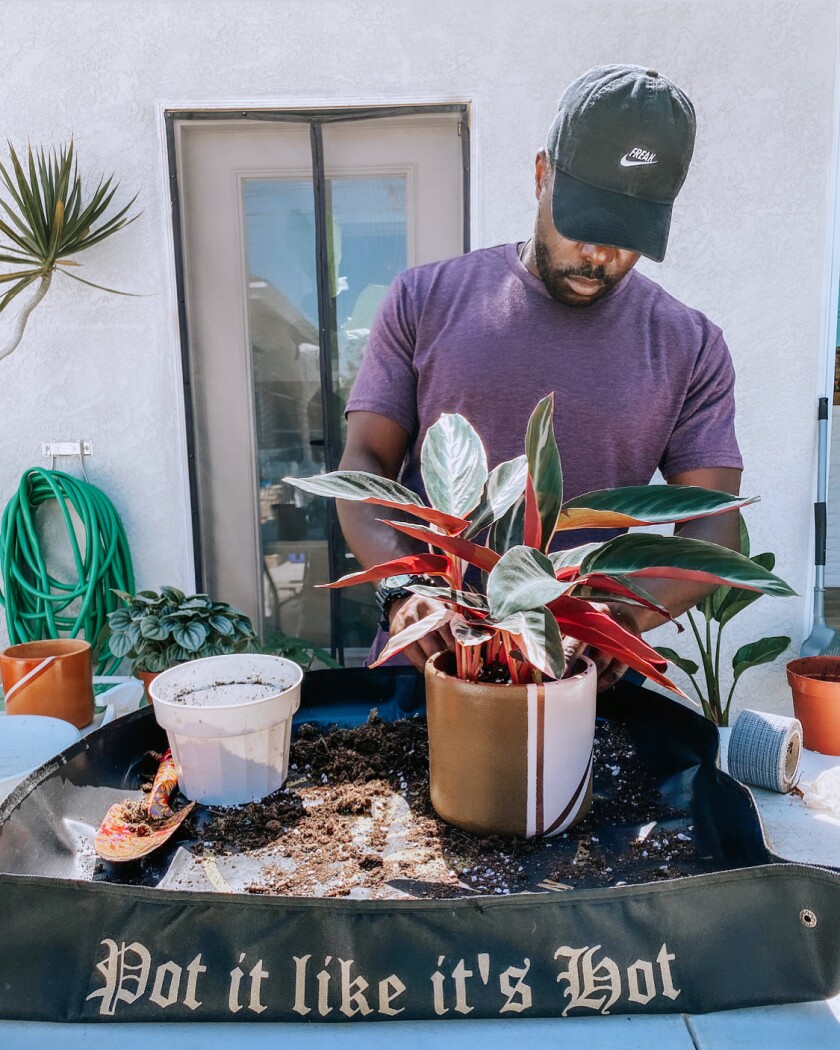
Terrence Williams is a longtime friend of Janessa Molina Maquindang’s, a fly plant papa and the newest addition to the FlyPlant team. Here, he adjusts a plant sitting atop FlyPlant’s waterproof gardening mat, which references Snoop Dogg’s 2004 single “Drop It Like It’s Hot.”
(Janessa Molina Maquindang)
The women of FlyPlant go way back.
Calipusan Ung affectionately described her relationship with Limbago as “frousins,” or friend-cousins. They grew up together, “practically sisters,” in Long Beach.
Last year, 35-year-old Molina Maquindang joined the family after marrying a cousin of Calipusan Ung and Limbago.
“Jay fits right in,” said Calipusan Ung, 37. “We’re lucky to have her.”
Prior to the pandemic, the three women were working in very different career fields.
Limbago, 32, ran a hyperbaric chamber and worked in finance on the side.
Calipusan Ung, a mom, continues to work at a real estate agency in Long Beach with her husband, where the pair heads up interior design. It was Calipusan Ung’s passion for interior design that spurred her interest in plants.
“I tell my clients that plants are a great way to go if you’re on a budget but you want to decorate and really transform a space,” she said.
Molina Maquindang had been working as an event planner in L.A. assisting with music festivals, parties and entertainment events.
“Once the pandemic hit, all the events were canceled, and pretty much I was out of a job,” the Oakland native recalled. “The only thing that really brought me peace was to be in my plants.”
Like many at the height of the pandemic, Molina Maquindang started a plant Instagram account. She requested to follow her future cousins-in-law, who approached her with their already-brewing idea of starting a plant shop. Soon after, FlyPlant was born.
All three women were familiar with plant care after working in their families’ gardens growing up, whether it was the reluctant chore of watering and putting eggshells in a grandparent’s garden or caring for a parent’s fruit and vegetable plants.
“My grandmother and my mother have always surrounded us with plants,” Molina Maquindang said. “I think it’s because it reminds them of home back in the Philippines. All of our rare plants, all the plants people are paying hundreds of dollars for, are literally growing in their backyard back in the Philippines. Unfortunately, we can’t just put them in our luggage and bring them back here, but we try to bring that life and that greenery back here in Cali.”
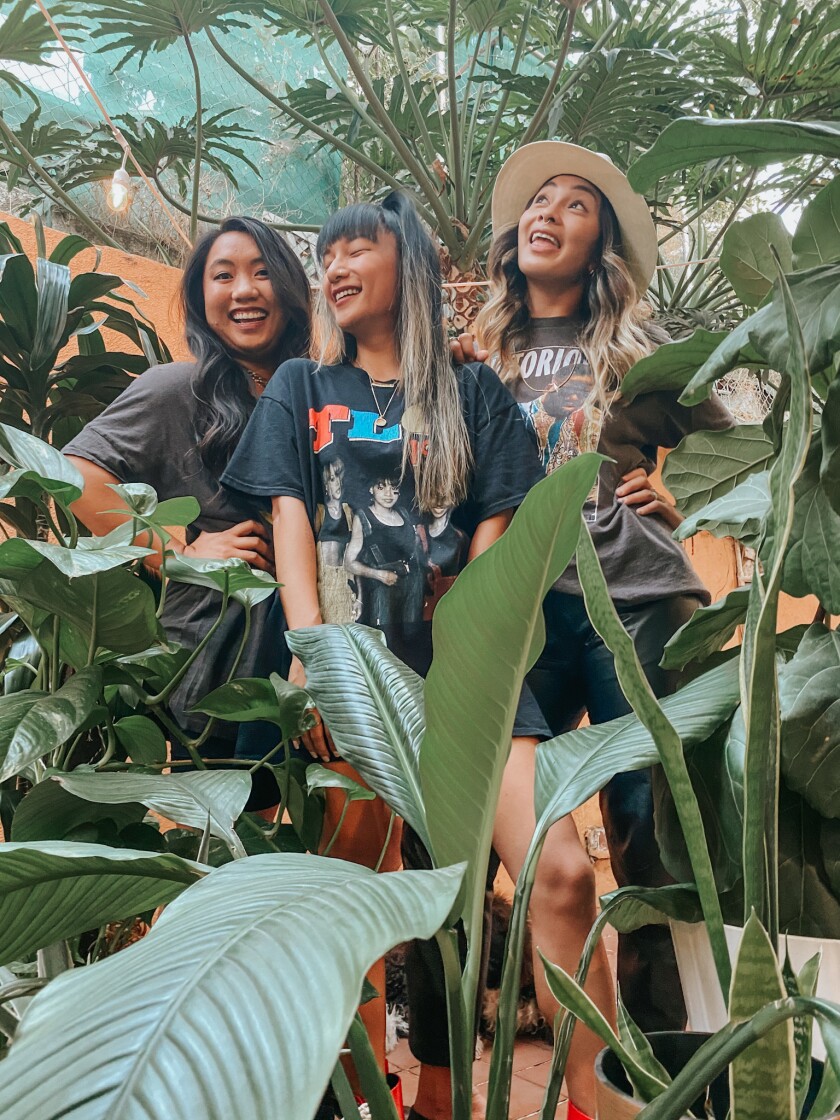
“The thing about plants is that they’re truly a universal language,” says Sheryl Calipusan Ung, right. “I was just telling Janessa, they’re a universal language, kind of like music.”
(Joshua Maquindang)
Due to the pandemic and social distancing restrictions, FlyPlant has called Calipusan Ung’s backyard home for over a year. Customers have been able to purchase plants via no-contact delivery or in person on Saturdays at FlyPlant’s pop-up shop events at the Filled Market in the Arts District’s Manila District.
But this August, FlyPlant will settle into a more permanent home: a warehouse in the Manila District that the founders hope to transform into an educational and social hub for the plant community.
Recently over Zoom, I spoke with Calipusan Ung, Molina Maquindang and Limbago to learn more about the process of creating FlyPlant, the inspiration and culture behind it and their goals for the business.
This interview has been edited for length and clarity.
What was the inspiration behind FlyPlant ?
Sheryl Calipusan Ung (SCU): A big part of it was that FlyPlant gave us the opportunity to really try out a passion-driven project, make it into a career and share it with people. It’s huge for us to be able to share something that we’re passionate about and then find people with like minds. They teach us; we’re able to teach them. It’s this constant community relationship that’s constantly growing.
And it’s not just FlyPlant. There’s so many other people and so many more stores and enthusiasts that inspire us, that really kind of create FlyPlant itself. We’re part of that community, and that’s huge for us.
Janessa Molina Maquindang (JMM): I think the thing that we wanted to embrace is that we’re very urban in a sense. We like hip-hop, we like R&B, we like streetwear. So we kind of wanted to mix that culture with our love of plants.
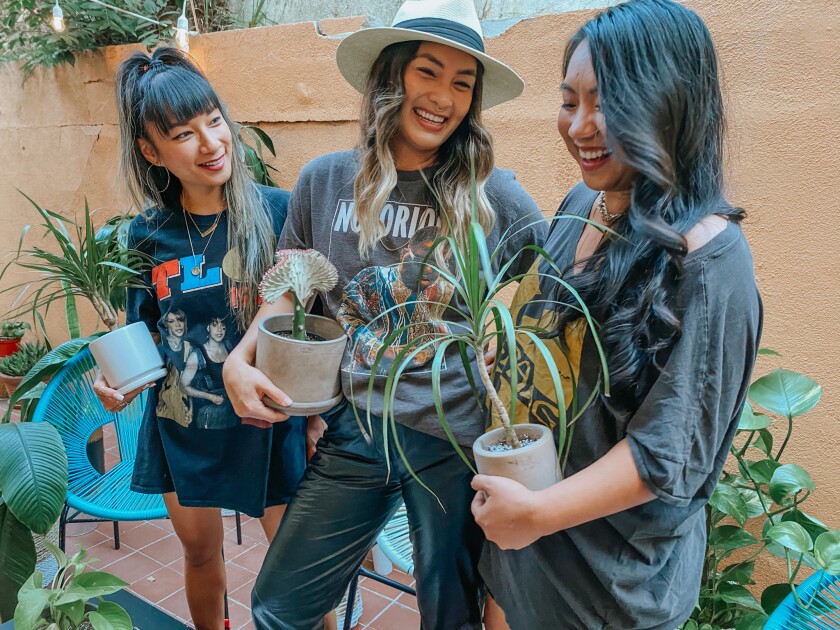
“Think of ‘In Living Color.’ Think of the Fly Girls. Think Missy Elliott and Aaliyah,” Janessa Molina Maquindang said, describing the vibe and culture that influence FlyPlant.
(Joshua Maquindang)
How do you reflect that culture in FlyPlant?
Melissa Limbago (ML): Well, it starts off with who inspires us, like through music. One of them was Beyoncé. So we had a plant, and we were like, “Oh, my God, she looks like Beyoncé’s hair!” So we called her Fern Bey, and she’s one of our little inspos. We name all our plants!
What goes into naming your plants?
JMM: We name most of them after artists, but then there’s this one that’s one of our staple plants. It’s a Sansevieria cylindrica ‘Starfish,’ and we call it the Westside.
Anybody from Cali knows what’s up with the Westside, so they need to have the Westside plant.
SCU: It’s fun, you know. That connection happens; you’re a little bit more invested when you name your plants.
JMM: Yeah, it adds life to the plant because it’s got character; it’s living. We feel like if we dance with them, if we name them and we talk to them, they seem to thrive a little bit more.
Speaking of names, what’s the story behind the name FlyPlant?
ML: I think we all have different interpretations of what “fly” means. I feel like with COVID and everything last year, everyone had an internal reflection. We had to look at ourselves and more deeply humble ourselves.
“Fly” has different meanings — being humble, not only just looking cool. It’s fun without being the perfect plant mom or dad. It’s about the journey; the journey is the best part of it. We’re still learning, and we’re still growing — no pun intended!
JMM: And we want to encourage people to find the flyness within themselves. Like Melissa said, we think “fly” has different meanings, not just like cool, but confident, unique and passionate. These different things — that’s what “fly” means to us. We want to incorporate that into our plants, into our culture and into the way we represent our business.
What else makes FlyPlant unique?
JMM: We love finding really unique, dope pots and pairing them with the plants. I think it makes it a little bit more special when we put together the perfect pair. That’s what we call “boo’d up.” It’s pretty much a live art piece.
SCU: And what we’ve learned through all of this is that one of the hardest things for people to do is picking out pots to really accentuate their plant. Thankfully, all three of us have an eye for that. So curating is a big part of our plants. I think that’s what sets us apart from other plant shops out there because a big focus of ours is on findin’ its boo!
JMM: You can’t let them be naked, and you definitely don’t want them with the wrong boo! That’d be all bad!
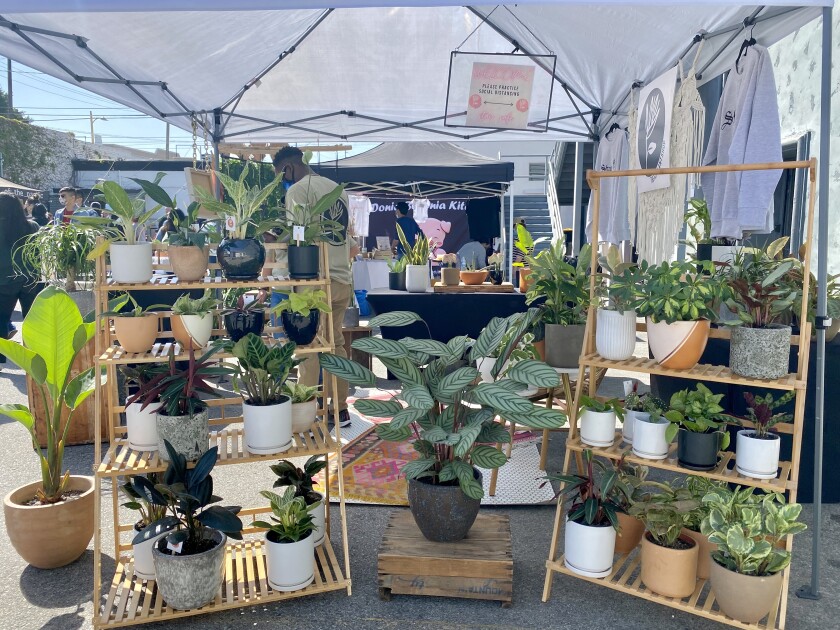
“Boo’d up!”: Customers can see FlyPlant’s signature plants and pots on display at its Saturday, outdoor pop-up shops in L.A.’s Arts District.
(Janessa Molina Maquindang)
Tell me more about the origins of FlyPlant.
SCU: So we just had our one-year anniversary in June. In the very heart of the pandemic was when it all began. And we were conflicted with it just because there was a lot going on at the time.
JMM: BLM is a huge movement, and the devastation of George Floyd had just happened.
SCU: And it was really important for us to really home in … and show our support. So that was a big, big time for FlyPlant.
JMM: We didn’t really know how to start through all the craziness that was happening. One of the things that we love, though, is giving back and having a purpose for what we’re doing. During that time when we were trying to release the business, BLM was heavy. I mean, it pretty much took over the whole of social media, so to put something new out didn’t feel right.
So what we decided to do with our first drop of plants and pot pairings was to give 100% of the proceeds to an organization called the Equal Justice Initiative. They help people who are incarcerated and are not getting the representation they need. We wanted to give back to that organization to help them get that help they needed. We felt right about launching that way.
I think [we donated] between $1,700 and $1,800.
SCU: That really solidified a lot of what we are about. It was just beautiful to see everyone coming together, not only just supporting us but also supporting an organization that is tirelessly working for the marginalized community.
It really solidified FlyPlant’s core and got us through the next launch and the following launch. So it was a beautiful way for us to introduce ourselves.
What was the hardest part of starting a business at the height of the pandemic?
SCU: Obviously the accessibility. I mean, we are a complete startup. So that alone was already an undertaking. Just having people have access to us was a big challenge.
We’re so grateful and thankful that things are opening up and people are feeling more confident. Because one of the biggest parts of FlyPlant that we love so much is the community interaction.
We were kind of put in a position where we had to really try to create this vibe and just this specialness of the passion that we have for plants on a digital platform. And we did, and people love it. When we go to our pop-up shops, people come and say “Oh, my gosh! Finally, I get to see you guys in the flesh,” and they feel it.
They understand us a little bit better, and I think the more and more people that come into our space and talk to us … that’s when they really understand and feel the essence of FlyPlant.
ML: In the beginning, we just did drop-offs, no-contact delivery. We would leave the plant outside our porch, they could pick it up, and now a year later we’re about to move into a space in the Manila District.
Tell me more about the pop-up shops. When and where do those take place?
SCU: We have our headquarters [in my backyard], and because of the pandemic, we haven’t really made it fully available for people to come and shop at the headquarters. But we’ve had certain events and pop-ups that have made it possible for our clients to see us and experience the FlyPlant Shop. Pop-ups at local bakeries in the Manila District’s Filled Market — that’s been kind of the second headquarters of FlyPlant.
JMM: Yeah, we started popping up during Filipino heritage month in October. We felt the need to support our fellow Filipino community and partner up with local Filipino businesses which were our friends. We promoted them and they promoted us, and that’s how it really started.
The Manila District [is] not necessarily on the map, but it’s starting to become on the map. It’s in the Arts District of L.A., and it actually started as a macro market bringing Filipino-owned businesses together. Some of them actually lost their jobs because of the pandemic, and we all joined together as an outdoor market to support each other and promote each other, and now it’s like a thing every Saturday with really, really good food, artists, crafts, handmade candles and FlyPlant.
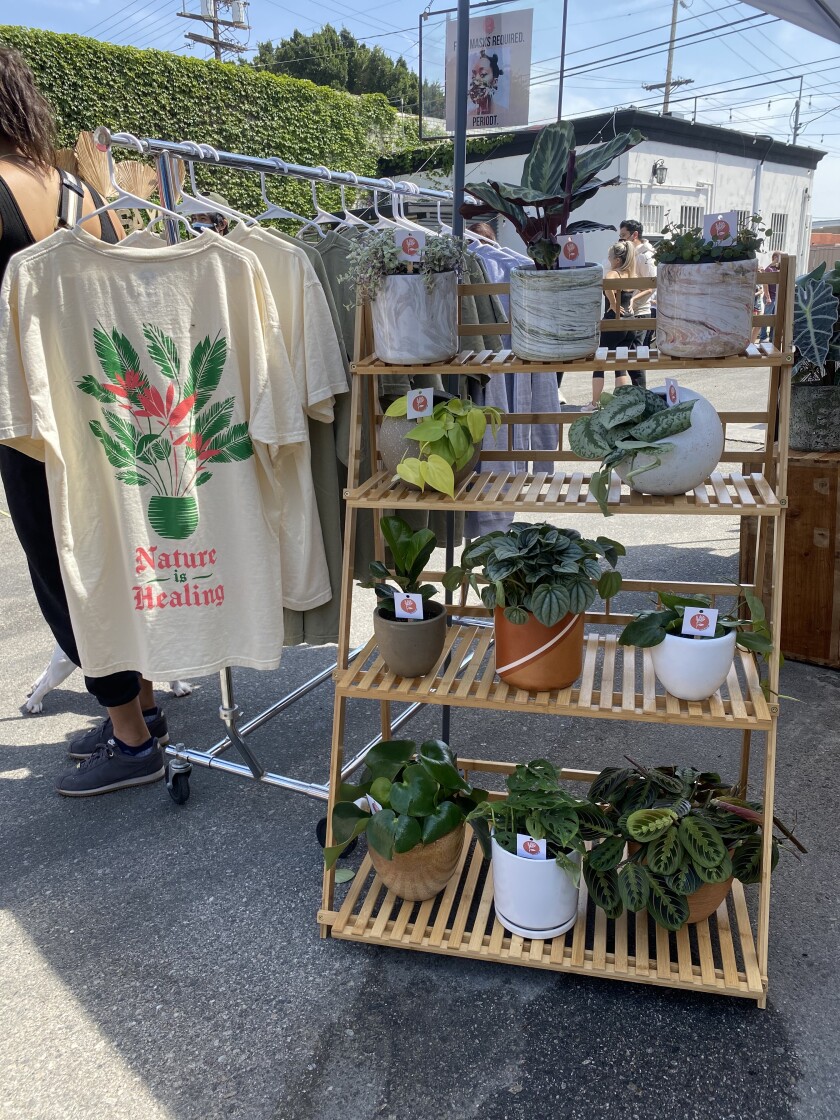
FlyPlant T-shirts on display at one of the shop’s pop-up events. “We’re totally into fashion,” Janessa Molina Maquindang says. “That’s part of the lifestyle of being fly. … We’re like walking art.”
(Janessa Molina Maquindang)
What are your plans for FlyPlant?
ML: Here’s a fun one: a FlyPlant music festival! Backstory behind that: When we were getting ready for our first pop-up, it was kind of reminding us of our Coachella days. It’d be dope. You’d have it in the Philippines. Like, “Meet us at the Monstera Tent, meet us at the Philodendron Tent!”
JMM: Like we’re saying, all of our cultures combined — like music, food, lifestyle, plants — that’s what a FlyPlant music festival would look like!
SCU: It’s an oasis, you know, the plan to create an oasis. But that’s a big future goal for us. A smaller goal is to really just bring the community in a little bit more. Like I said, accessibility was a huge challenge for us, so going into this new space, people will understand FlyPlant and we’ll be able to create and be part of plant events and join other plant communities.
ML: I think also bringing the community together by having more educational workshops. We get a lot of compliments on all our tips. And I really enjoy teaching others how to care for their plants. I think that’ll bring the community closer together as well.
SCU: And it’s going to help grow the community knowledge of plants. We don’t want people to just bring a plant into their home because it creates a cute space but it dies after a week. No, like this is in your care now; let us help you! We work hand in hand with our customers to curate a good base of knowledge, and then we’ll help build that knowledge, hopefully through workshops.
A lot of our customers take pictures and DM us to say, “What’s going on with my plant?” Right now, we assess it that way, identify the things that are going wrong with their plant and find interventions through our digital platform.
Having a space and having more workshop events will create that solid foundation for our clients to really be confident as plant mamas and papas!
Finally, what is your favorite plant?
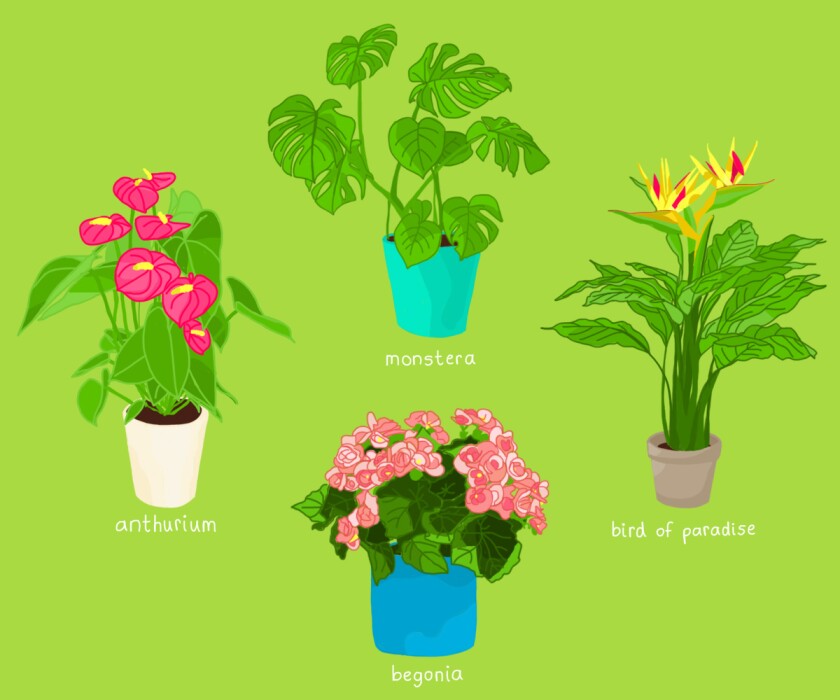
FlyPlant’s favorite plants: anthurium, monstera, bird of paradise and begonia.
(Claire Reid / Los Angeles Times)
SCU: Mine is a monstera. That was my absolute first plant ever. And man, did I put this one through the wringer. He keeps thriving for me regardless! Definitely, hands down, my favorite. And the Philippines has a ton of them, so I cannot wait to go home and just pick, prune and pot them in my parents’ little inn and just create this monstera forest.
That’s my absolute favorite plant because we’ve connected in that sense where, he’s pulled through regardless of if I was there for him or not. He’s showed me the way to pull through, grow and thrive, and he’s popping now because he and I are on the same page! I’m lucky to have my monstera.
JMM: Man, that’s a hard question. I think I have a twofer. I think the life-transforming plant for me was the anthurium. Anthuriums for me, especially the ‘Black Queen,’ remind me of the islands, specifically Hawaii because I lived there for a while.
One of my anthuriums was given to me by my aunt, and I think while I took care of it I was in a really bad place. Taking care of it actually helped me heal through this dark time in my life. So anthuriums have been my saving grace.
And for my second one, I would say, I’ve always gravitated towards birds of paradise. We call it the BOP. Birds of paradise are such an island vibe! We’ve always seen it at pretty much any island and definitely back at home in the Philippines and in Hawaii. It represents that tropical vibe we all embrace.
SCU: It’s also the logo of FlyPlant. If you see the letter F in FlyPlant, it’s a bird of paradise!
And Melissa, what’s your favorite plant?
ML: I like the begonia. They’re a little funky-looking. I tend to gravitate towards the funky, more unique plants that are not as easy to take care of. It’s been a journey with them. I like the look and the vibe and the way that you can just see how it grows from itty bitty to a big ol’ bush. I like the whole process!
SCU: It’s so funny because Melissa is the type to want to challenge herself. It’s amazing how plants describe the person really well. So this is a great question.
The FlyPlant Shop will relocate to its new storefront in the Manila District in Los Angeles’ Arts District in August. A grand opening event will take place in August at the Filled Market. The event will feature a pop-up shop, music and food. Attendees will also have the opportunity to check out FlyPlant’s new home!
Follow @theflyplantshop on Instagram for updates on the grand opening and other fly events.
appId : '134435029966155',
xfbml : true, version : 'v2.9' }); };
(function(d, s, id){ var js, fjs = d.getElementsByTagName(s)[0]; if (d.getElementById(id)) {return;} js = d.createElement(s); js.id = id; js.src = "https://connect.facebook.net/en_US/sdk.js"; fjs.parentNode.insertBefore(js, fjs); }(document, 'script', 'facebook-jssdk'));
For all the latest Life Style News Click Here
For the latest news and updates, follow us on Google News.
